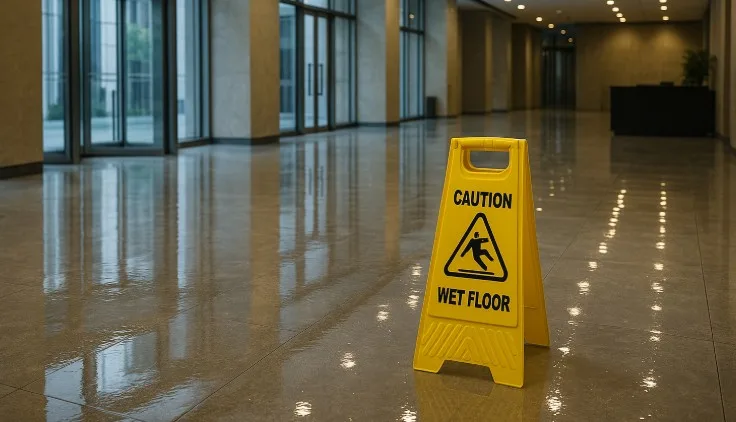At Gould Injury Law, our personal injury attorneys know that slip and fall accidents on wet marble floors are among the most serious yet preventable causes of injury in Connecticut. Whether they occur in office buildings, hotels, or public spaces, these incidents can lead to severe injuries, expensive medical treatment, and lasting physical and emotional pain.
When building managers and property owners fail to take reasonable care to prevent wet floor slip hazards, they can be held accountable under premises liability laws. But determining who’s responsible—and proving negligence—requires a clear understanding of how these accidents happen and what safety measures should have been in place.

The Hidden Danger of Wet Marble Floors
Marble floors are beautiful and elegant, but they’re also among the most slippery floor materials when wet. Even a small spill, leak, or condensation can make the surface treacherous. When combined with polish, wax, or cleaning agents, the risk increases dramatically.
In commercial and residential buildings, wet floors can result from:
- Mopping or cleaning without proper wet floor signs
- Leaking pipes or air conditioning condensation
- Spilled drinks or tracked-in rainwater
- Poorly maintained drainage or ventilation
- Broken seals or cracked tiles allowing water buildup
When these hazards are not promptly addressed or clearly marked, fall accidents happen—and the consequences can be serious.
Common Injuries From Slip and Fall Accidents
A slip and fall injury on marble can cause far more than a bruised ego. Victims frequently suffer serious injuries requiring immediate medical attention and long-term care. Common injuries include:
- Broken bones and fractures, especially in wrists and hips
- Head injuries and concussions
- Traumatic brain injuries (TBIs), back and spinal cord injuries
- Soft tissue injuries and torn ligaments
- Emotional distress and post-traumatic anxiety
Because marble surfaces offer little traction, a wet floor slip can happen instantly and leave lasting effects. Victims often face medical bills, lost wages, and months of physical therapy or ongoing treatment.
Who Is Responsible for a Slip and Fall on Wet Floors?
Responsibility for a slip and fall accident on wet marble floors often depends on who controls the property and whether they acted reasonably to prevent harm. In Connecticut, building managers and property owners have a legal duty to maintain a safe environment for tenants, employees, and visitors.
If a building manager knew—or should have known—about a dangerous condition like a wet or slippery surface but failed to act, they may be found negligent under premises liability law.
Examples of Negligence May Include:
- Failing to place wet floor signs during cleaning or after a spill
- Ignoring maintenance records showing a recurring leak or hazard
- Delaying repairs after reports of unsafe flooring
- Using inappropriate floor cleaning products that increase slipperiness
- Poor lighting or lack of visible warnings
When the property owner fails to take these reasonable precautions, they can be held liable for any resulting injuries sustained.
The Building Manager’s Legal Duty
Under Connecticut premises liability laws, building owners and managers must act as a reasonable person would under similar circumstances. This includes:
- Conducting regular safety inspections
- Ensuring maintenance crews follow proper safety protocols
- Promptly addressing wet floors and other hazards
- Keeping accurate incident reports and maintenance records
- Posting clear warning signs near wet marble floors or recently cleaned areas
Failing to meet this standard is considered a breach of legal duty—a central element in most slip and fall claims.
Proving Negligence in a Slip and Fall Case
Winning a slip and fall lawsuit depends on proving negligence. Your personal injury lawyer must demonstrate four key elements:
- Duty of Care – The property owner or manager owed you a legal duty to keep the premises safe.
- Breach of Duty – They failed to act as a reasonable property manager would.
- Causation – The breach caused your slip and fall injury.
- Damages – You suffered measurable harm such as medical expenses, lost wages, or emotional distress.
Evidence is critical. This often includes:
- Photos or videos of the wet floor or missing wet floor signs
- Witness statements from bystanders or employees
- Medical records and bills documenting your injuries
- Incident reports filed with building management
- Maintenance logs showing whether proper procedures were followed
At Gould Injury Law, our team specializes in gathering evidence quickly and preserving critical proof before it disappears.
Comparative Negligence in Connecticut
Connecticut follows a modified comparative negligence rule, meaning your compensation can be reduced if you’re found partly responsible for the fall accident. For instance, if you ignored visible warnings or entered a clearly marked “wet floor” area, your award could be reduced by your percentage of fault.
However, if the building manager failed to provide any warning signs or left water standing for an unreasonable amount of time, you could still recover full damages. An experienced personal injury lawyer can help ensure that your share of liability is minimized while maximizing your compensation.
What to Do After a Slip and Fall on Wet Marble
If you’re injured in a slip and fall accident, your actions immediately after the incident can greatly affect your ability to recover compensation. Here’s what to do:
- Seek immediate medical attention. Your health comes first, and medical documentation is vital for your case.
- Report the incident to building management right away and request a written report.
- Take photographs of the area, especially the wet marble floor and any missing or improper wet floor signs.
- Get witness contact information from anyone who saw the accident occur.
- Avoid giving statements to the insurance company without consulting an attorney.
- Contact a slip and fall accident attorney at Gould Injury Law to protect your rights and begin building your case.
Prompt action not only helps prove property owner’s negligence but also ensures that all legal deadlines are met under Connecticut law.
Compensation Available for Slip and Fall Victims
Victims of slip and fall accidents caused by property owner negligence may be entitled to compensation for:
- Medical expenses (including emergency care, hospital stays, and rehabilitation)
- Future medical expenses for ongoing care
- Lost wages and reduced earning capacity
- Pain and suffering
- Emotional distress
- Permanent disability or disfigurement
In some cases, victims may also pursue punitive damages if the property owner showed willful disregard for safety.
How Gould Injury Law Can Help
At Gould Injury Law, we’re known for acting fast—because when you’ve suffered an injury, you need results, not delays. Our personal injury law firm has extensive experience handling premises liability cases across Connecticut, from Waterbury, to Hartford, to New Haven.
When you hire our team, we will:
- Conduct a thorough investigation of the accident scene
- Collect and preserve all relevant evidence
- Work with experts to reconstruct the fall accident
- Handle all communication with the insurance company
- Negotiate aggressively for a fair settlement
- Take your case to court if necessary to seek compensation for your losses
Our mission is simple: to hold negligent property owners accountable and get you the justice you deserve—fast.
Contact Gould Injury Law for a Free Consultation
If you’ve been injured in a slip and fall on wet marble floors, you may have a valid personal injury claim. The team at Gould Injury Law can help you determine whether a building manager or property owner was responsible for your slip and fall injuries and fight to recover maximum compensation for your medical bills, lost wages, and pain and suffering.
Don’t wait to protect your rights. Call (888) WIN-FAST (888-946-3278) today or contact us online to schedule your free consultation.
At Gould Injury Law, we act fast to help you heal, recover, and move forward with confidence.
